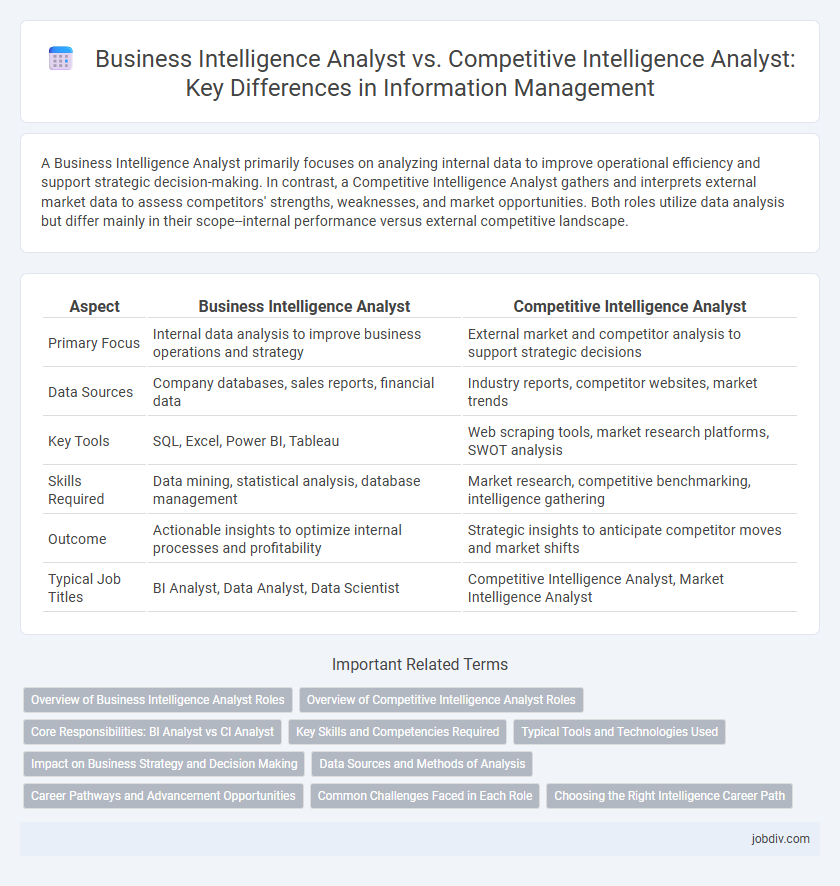A Business Intelligence Analyst primarily focuses on analyzing internal data to improve operational efficiency and support strategic decision-making. In contrast, a Competitive Intelligence Analyst gathers and interprets external market data to assess competitors' strengths, weaknesses, and market opportunities. Both roles utilize data analysis but differ mainly in their scope--internal performance versus external competitive landscape.
Table of Comparison
| Aspect | Business Intelligence Analyst | Competitive Intelligence Analyst |
|---|---|---|
| Primary Focus | Internal data analysis to improve business operations and strategy | External market and competitor analysis to support strategic decisions |
| Data Sources | Company databases, sales reports, financial data | Industry reports, competitor websites, market trends |
| Key Tools | SQL, Excel, Power BI, Tableau | Web scraping tools, market research platforms, SWOT analysis |
| Skills Required | Data mining, statistical analysis, database management | Market research, competitive benchmarking, intelligence gathering |
| Outcome | Actionable insights to optimize internal processes and profitability | Strategic insights to anticipate competitor moves and market shifts |
| Typical Job Titles | BI Analyst, Data Analyst, Data Scientist | Competitive Intelligence Analyst, Market Intelligence Analyst |
Overview of Business Intelligence Analyst Roles
Business Intelligence Analysts specialize in analyzing internal data systems to improve organizational decision-making by developing dashboards, reports, and predictive models that reveal operational patterns. They work primarily with data warehousing, ETL processes, and BI tools like Tableau, Power BI, or SQL to transform raw data into actionable business insights. Their role centers on optimizing business processes, enhancing performance metrics, and supporting strategic planning through quantitative analysis.
Overview of Competitive Intelligence Analyst Roles
Competitive Intelligence Analysts specialize in gathering and analyzing market and competitor data to inform strategic business decisions and identify growth opportunities. Their role involves monitoring industry trends, assessing competitor strengths and weaknesses, and preparing detailed reports that guide product development, marketing strategies, and risk management. By leveraging tools such as SWOT analysis, market research, and data visualization, these analysts provide actionable insights that improve an organization's competitive positioning.
Core Responsibilities: BI Analyst vs CI Analyst
Business Intelligence Analysts focus on collecting, analyzing, and visualizing internal data to optimize business operations and support decision-making through data-driven insights. Competitive Intelligence Analysts concentrate on researching market trends, competitor strategies, and external factors to provide actionable intelligence for strategic planning and maintaining competitive advantage. BI Analysts utilize tools like SQL, Tableau, and data warehousing, whereas CI Analysts leverage market research, SWOT analysis, and competitor profiling methods.
Key Skills and Competencies Required
Business Intelligence Analysts require strong data analysis, statistical proficiency, and expertise in data visualization tools like Tableau and Power BI to transform complex datasets into actionable insights. Competitive Intelligence Analysts focus on research skills, market analysis, and strategic thinking to assess competitors, industry trends, and potential threats effectively. Both roles demand critical thinking, proficiency in data interpretation, and excellent communication skills to support informed business decision-making.
Typical Tools and Technologies Used
Business Intelligence Analysts commonly utilize data visualization tools like Tableau, Power BI, and Excel for analyzing internal datasets, alongside SQL and Python for data querying and automation. Competitive Intelligence Analysts leverage web scraping tools, market research platforms such as Crayon and SimilarWeb, and social media monitoring software for external competitor analysis. Both roles increasingly incorporate AI-driven analytics and cloud-based solutions like AWS or Azure to enhance data processing capabilities.
Impact on Business Strategy and Decision Making
A Business Intelligence Analyst leverages data analytics and reporting tools to identify trends and optimize internal operations, directly influencing strategic planning and performance improvements. In contrast, a Competitive Intelligence Analyst focuses on gathering and analyzing external market data, competitor activities, and industry developments to inform strategic positioning and anticipatory decision-making. Both roles critically enhance business strategy by providing actionable insights, but Business Intelligence centers on internal efficiency while Competitive Intelligence drives market responsiveness.
Data Sources and Methods of Analysis
Business Intelligence Analysts primarily leverage internal data sources such as sales records, financial reports, and operational metrics, employing methods like data mining, predictive analytics, and dashboard reporting to optimize business performance. Competitive Intelligence Analysts gather external data from market trends, competitor reports, and industry publications, using techniques such as SWOT analysis, benchmarking, and competitive mapping to assess market positioning. Both roles require proficiency in data visualization tools and statistical software to transform raw data into actionable insights for strategic decision-making.
Career Pathways and Advancement Opportunities
Business Intelligence Analysts typically follow career pathways that advance through roles such as Data Analyst, BI Developer, and eventually BI Manager or Director, emphasizing technical skills in data visualization, SQL, and dashboard creation. Competitive Intelligence Analysts often progress by gaining expertise in market research, strategic analysis, and competitive strategy, moving toward positions like Competitive Intelligence Manager, Market Research Director, or Strategy Consultant. Advancement opportunities in both fields require strong analytical capabilities, domain knowledge, and the ability to translate complex data into actionable business insights.
Common Challenges Faced in Each Role
Business Intelligence Analysts often encounter challenges related to data quality, integration, and transforming vast datasets into actionable insights, requiring strong analytical skills and proficiency in data visualization tools. Competitive Intelligence Analysts face difficulties in gathering accurate competitor data, navigating ethical limitations, and providing timely strategic insights amid constantly changing market dynamics. Both roles demand adaptability, critical thinking, and a deep understanding of industry trends to overcome these challenges effectively.
Choosing the Right Intelligence Career Path
Business Intelligence Analysts specialize in analyzing internal data to optimize business performance, leveraging tools like SQL, Tableau, and Power BI to provide actionable insights. Competitive Intelligence Analysts focus on external market trends, competitor strategies, and industry developments using sources such as market reports, public data, and social media analytics. Choosing the right career path depends on whether you prefer deep data analysis for internal decision-making or strategic evaluation of external competitive landscapes.
Business Intelligence Analyst vs Competitive Intelligence Analyst Infographic

 jobdiv.com
jobdiv.com